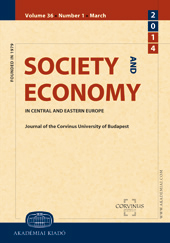The American Economy and Its Global Links: New and Reborn Concerns
The American Economy and Its Global Links: New and Reborn Concerns
Author(s): István MagasSubject(s): Economy, National Economy, Supranational / Global Economy, Financial Markets
Published by: Akadémiai Kiadó
Keywords: large open economy; global systemic behaviour and coordination mechanism; global public goods; global finance;
Summary/Abstract: In a systemic perspective, what are the primary transmitters of global competitiveness with the proper coordination mechanism? What are the systemic impacts of the US economy on world markets? Is global economic stability a public good? To address these questions, the paper surveys some key global links of the largest open economy of the world. First: past and recent US patterns of international wealth building; second: American-born business cycle concerns; third: international asset market developments are discussed. We argue that the two prime transmitters of competitive forces in the global economy are the multinational corporations and the international capital markets. They both show revealed systemic behaviour and good coordination mechanisms with well-defined goals and measurable efficiency for themselves. In a global economic framework, however, these are insufficient as sole coordination mechanisms since national government choices, as well as multinational company and individual international investment decisions do remain largely within their “own” perceived boundaries, and without regard to any “globally defined” or desired goals. This present dichotomy of determining international economic events by large-country (e.g. USA, EU-15, Japan) preferences, but in fact domestic macroneeds, and by firm-level multinational company preferences, is not likely to change soon. Yet, there is an obvious need to coordinate national policy actions, regulate multinational company behaviour and agree on some commonly shared safety rules of international financial markets. These global coordination efforts can be looked at as contributions to the provision of global economic stability, which is a valuable public good. We reason that national governments and regulators learn also, and that there is an evolution in keeping useful elements of government intervention such as anti-cyclical policies. If the macroeconomy is not self-correcting, and it is not, the global economy is even less so. Thus, there is room and justification for global coordination of macropolicies. For instance, based on the international wealth building pattern of the US economy, we suggest that for a more even and sustainable future growth-pattern for the world economy, a higher US savings rate and a higher Japanese and euro-area consumption rate would be beneficial. Also, to prevent the hiding of unwanted risk internationally, the calls for global supervision of international capital mobility are warranted if they are to match the rapidly growing intra-company cross-border flows of funds with proper safety regulation. US policymakers should play a key role in promoting such global efforts to meet the strong global demand for economic stability.
Journal: Society and Economy. In Central and Eastern Europe ǀ Journal of the Corvinus University of Budapest
- Issue Year: 26/2004
- Issue No: 1
- Page Range: 1-40
- Page Count: 40
- Language: English

